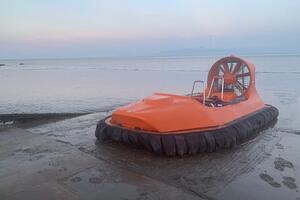Intertidal Habitat survey to take place in the Morecambe Bay area
Natural England will undertake a survey of Morecambe Bay, the Duddon Estuary and Lune Estuary from 5-10 April 2023

Hovercraft on intertidal mudflats
- Intertidal habitats are those which are exposed at low tide and vital for wildlife.
- The survey, and the results, will help understand more about the condition of protected habitats in line with Natural England’s role to conserve, enhance and manage the natural environment.
The areas of Morecambe Bay, the Duddon Estuary and the Lune Estuary are to be surveyed by Natural England from the 5-10 April 2023 to understand more about the areas and habitats that are exposed at low tide, also known as the intertidal zone.
Morecambe Bay is designated as a Special Protection Area and Special Area of Conservation; and the neighbouring estuaries are designated as Sites of Special Scientific Interest. The site provides internationally important feeding and nesting habitat for migratory bird species, including the ringed plover, oystercatcher, little tern and arctic tern.
Natural England has a statutory duty to monitor the condition of designated sites in England. A hovercraft will be used to access the site safely, which uses a cushion of air to glide across the surface causing less damage to the local habitat.
The survey works, which are fully permitted, will involve mapping the habitats to understand more about the area including details about the mud and sand and the animals that live within them, that birds rely on for food.
Louise Whatley from Natural England said:
“ This survey is part of Natural England’s duty to conserve, enhance and manage the natural environment, and monitor the condition of the area of Morecambe Bay, the Duddon Estuary and the Lune Estuary.
“ The results will help improve our understanding about the area and the conditions of these designated sites and habitats, and how Natural England and other local partners can make further improvements to allow wildlife to thrive.”
This work is part of the marine Natural Capital and Ecosystem Assessment (mNCEA) programme, which is a 3-year research and development programme led by Defra, that will produce evidence and tools to bring together ecological, societal, and economic information, to improve our understanding of the complex trade-offs faced in using marine environments sustainably.